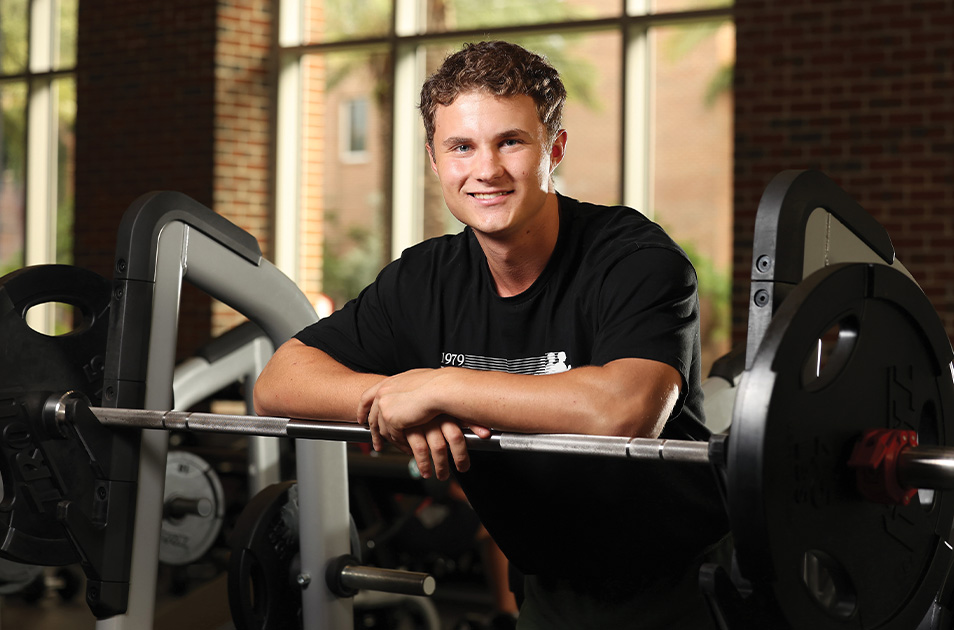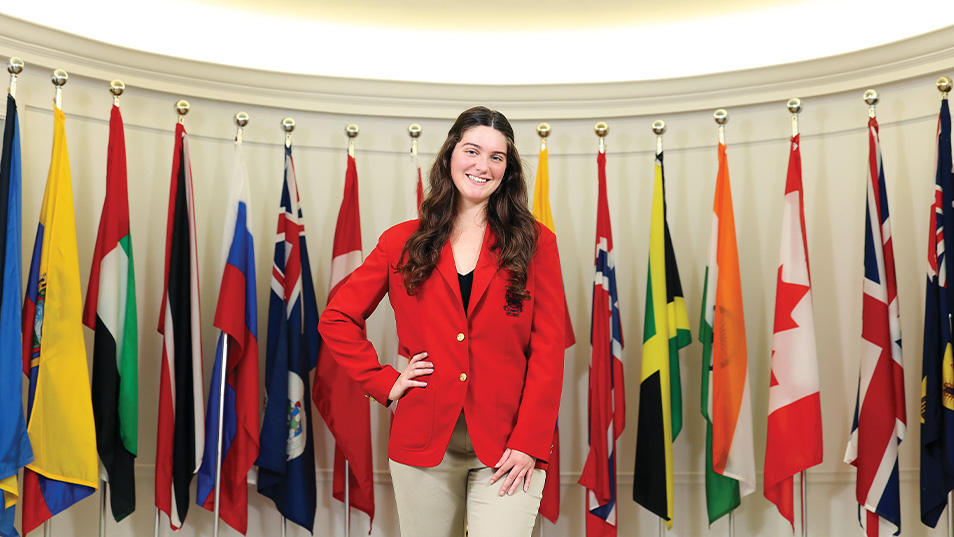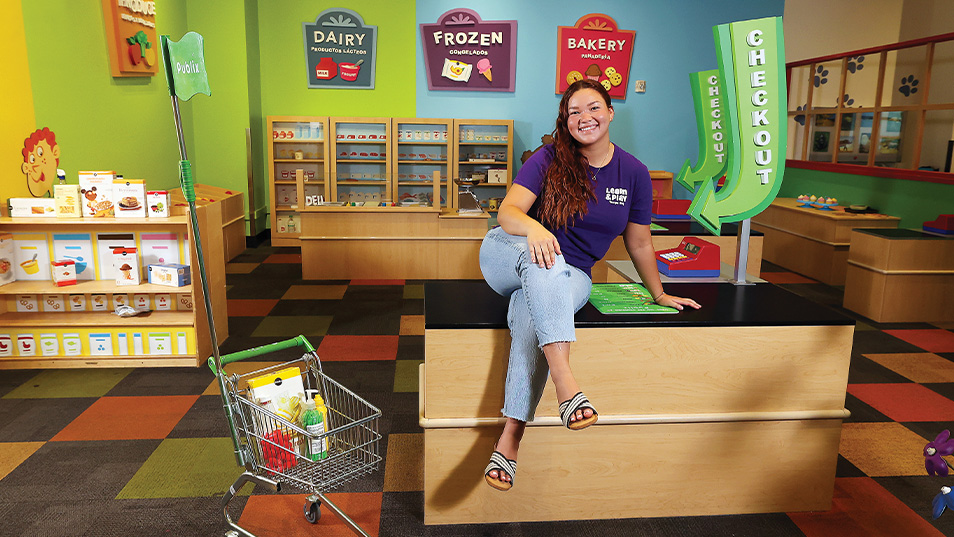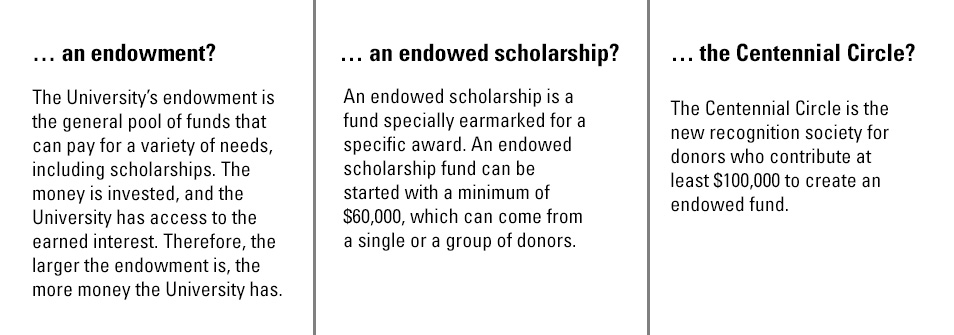Contact us
401 W. Kennedy Blvd.
Tampa, FL 33606-13490
(813) 253-3333
Centennial Circle supports students, strengthens the University

“It would blow their minds," Curt Bochantin ’26 says if donors realized how truly important their gifts are to the lives of students. Photograph by Jessica Leigh
By Holly Neumann
The story of The University of Tampa over the past several decades is one of remarkable growth and impact.
Some growth is measurable. Enrollment has soared; the campus footprint expanded; academic programs multiplied. Harder to quantify but equally undeniable: the University’s reputation, prestige and esteem have risen on a national and global scale.
The same goes for impact. On the local economy, it’s known: UT contributes $1.4 billion annually; graduates stay — 67% of undergrads and 81% of graduate students plan to live and work in the Tampa Bay area; tens of thousands of internships are completed each year, resulting in a readier workforce.
Now, as UT looks ahead at the next several decades, the story is shifting to how the University should continue to advance itself.
To address that, UT is investing in its most valuable resource, its students — the same people in whom the University’s impact on their academic, professional and individual growth is almost immeasurable.
The investment is taking shape with the creation of the Centennial Circle recognition society, named to commemorate the University’s upcoming 100th anniversary in 2031 and celebrate the philanthropy of donors who contribute $100,000 or more to create an endowed fund. The society aims to increase the University’s scholarship endowment, as the gap nationally between tuition costs and the amount of state and federal aid available to students and their families has widened at the same time demand for a UT education has grown.
“An endowment for any university, especially for a private university, is important because it makes the university and all of its experiential learning opportunities accessible to deserving, top-of-the-class students, regardless of their socio-economic background,” said Erin McKenney, UT’s capital campaign director.
For UT students already benefitting from scholarships, the importance is real, and the impact is personal.

“It would blow their minds," Curt Bochantin ’26 says if donors realized how truly important their gifts are to the lives of students. Photograph by Jessica Leigh
TAKING A WEIGHT OFF
“Knowing that a little bit of that financial burden is being lifted off your shoulders really works wonders,” said Curt Bochantin ’26, an entrepreneurship major. Without tuition worries, Bochantin said, he’s been able to focus on what interests him, specifically fitness, co-curriculars like Fellowship of Christian Athletes, and his internship at Metropolitan Ministries in Tampa.
Bochantin works in family outreach for Metropolitan Ministries. He shops with clients for clothing, hygiene products and other basic needs. He also does some business analytics and marketing, tapping into his academic side for the mutual benefit of the organization and his own learning.
“I get to go work in a great place,” he said. “Philanthropy. I love it. I've gotten to interact with so many people, and it’s led to me wanting to give more back.”
Bochantin says, too, that he found a supportive community in the Benson Alex Riseman Fitness and Recreation Center, and in a lot of ways, this allows him to plan for his future. He’d like to own a gym someday.
“There are so many opportunities and outlets and doors that open from the moment someone decides to give to UT,” he said. “I’m not sure if people are aware of all of it, but I think it would blow their minds.”

Cassidy Wilson '24 is president of the UT Diplomats, one of the oldest student organizations on campus. Photograph by Jessica Leigh
LEADING THE WAY
Cassidy Wilson ’24 agrees that donors “have more impact than they know.”
A scholarship is largely what brought Wilson to UT from Connecticut, and since she’s been here, she’s been determined to make the most of it. The senior advertising and public relations major also studies leadership and
has been a member of the President’s Leadership Fellows since her first year.
The fellowship’s curriculum requires experience in a nonprofit. Wilson works with a group for Muslim teens called IAM Youth Group, which Wilson described as being like an after-school program, but it meets on weekends.
The organization’s mission specifically mentions leadership, but they needed help developing programming around those skills, especially for girls. Wilson created a 50-page workbook of learning modules and lesson plans for their volunteer teachers.
“The founder would email me and say, ‘This is their favorite part of the day, getting to do the leadership lesson,’” Wilson said.
Once her PLF project was complete, Wilson’s obligation was satisfied, but she had established a relationship with the group, and so when one of her classes required her to explore digital media and advertising, she again offered her services to IAM Youth Group. She created graphics, digital fundraisers and a social media calendar — and also taught the founder how to use specific technologies, so she could do these sorts of tasks on her own.
“I was, like, you know, I've already helped on this so much. Why don't I keep going with it?” Wilson said, and now she wants to make sure others can pick up where she leaves off when she graduates.
“The goal with PLF is that you leave a kind of legacy, something that can be continued, so it can have a longer impact,” she said.
Wilson also is leaving a legacy on campus. She’s the president of UT Diplomats, one of the oldest UT student organizations, and has represented UT in the Chamber of Commerce Collegiate Leadership Tampa Bay program. One great benefit of both, she said, is getting to know more people.
“Every conversation I've had has taught me something, and all of those conversations helped me find what I'm interested in now,” she said.
Wilson is developing her own content-creation business. She plans to travel and partner with nonprofits in the countries she visits, offering them her expertise in writing, social media, video and photography. She was first inspired by an aunt who was in the Peace Corps, and her time at UT has taught her that she doesn’t want to be “boxed in.”

Priscilla Bravo ’24 says her job at Glazer Children's Museum has helped connect her to the Tampa community. Photograph by Jessica Leigh
AT HOME AT UT
Similarly, Priscilla Bravo ’24, a public health major, says the opportunities at UT have taught her much about herself.
“If I didn't have my scholarship, I wouldn't have an internship,” she said. “I wouldn't know that I like nonprofits. I wouldn't know that I like children.
I wouldn't know that I like educating families and educating the community on certain health topics, and I just wouldn't have the professional skills.”
Bravo works at the Glazer Children’s Museum as part of her scholarship agreement. She’s been there almost four years, helping parents and kids connect through early-learning songs, dance and play. The education component of the program aligns well with her major and concentration in health promotion.
Bravo is from Puerto Rico, and she first became interested in health education when Hurricane Maria devastated the island in 2017.
“What shocked me the most was there were not enough people, there was not enough education, and there were not enough ways to give information to those who didn't have the access, especially older generations in our rural communities,” she said.
She said that public health is underappreciated in Puerto Rico, making her education at UT especially valuable. She plans to stay stateside, at least at first, after she graduates.
“If I do decide to go back to Puerto Rico, it would be after I gain some experience and I'm sure I can make a change back home,” she said.
Meanwhile, she’s seen and been a part of change at UT. She is the secretary of the Public Health Association and has been a peer mentor.
Bravo does her best to make other students feel welcome and transition to college life. She says she’s noticed a larger and more involved Hispanic community on campus, which makes things “feel like home.”
Still, Bravo appreciates the push she got to get involved in the community with her internship.
“It's so important that not only you stay at the University and learn about the campus, but you also connect with the outside,” Bravo said. “UT has a lot of great opportunities, and even first-year students can get to know Tampa and get to know the community and make a change.”
LOOKING AHEAD
Bravo, Wilson and Bochantin are just three of the more than 90% of UT students who received some form of financial aid at UT this year, funds that include contributions from the University’s endowment.
Donations to the general endowment create scholarships in perpetuity, as awards are drawn from the endowment’s interest. Large donations, like those made by Centennial Circle members, can create standalone, endowed, named scholarships.
McKenney sums it up: “For UT to attract and retain the quality of students that we are hoping to serve, we need to be able to provide more scholarships.”
WHAT IS.....

More UT News